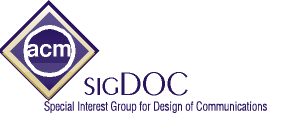
ACM SIGDOC
Annual Awards for Contributions to the Field of Technical Communications
Invitation for Nominations
The ACM SIGDOC Executive Board welcomes letters of nomination for the SIGDOC
Rigo and Diana Awards. The Rigo Award celebrates an individual's lifetime
contribution to the field of information design, technical communication,
and online information design; the Diana Award celebrates the contribution
of an organization, institution, or business. Letters of nomination should
describe your relationship to the nominee, your rationale for nominating
him/her, and provide supplementary materials that list achievements and notable
contributions to the field (in the form of web materials, reviews, or hardcopy
vita information). Send letters of nomination to
Dr. Brad Mehlenbacher
ACM SIGDOC Awards Chair
Technical Communication, Box 8105
NC State University, Raleigh, NC 27695
email: brad_m@unity.ncsu.edu
website: http://www4.ncsu.edu/~brad_m
fax: 919.515.6071
Rigo and Diana Awards History
The Rigo and Diana awards are named after Joseph Rigo,
SIGDOC's founder, and Diana Patterson, past chair of SIGDOC
for three terms. The awards are given annually. Nominations are considered
carefully by the SIGDOC Executive Board (elected and appointed members) each
year, and the final recipients are determined in a series of run-off votes.
Since 1988, the Rigo award has been given to the following people:
- 1988 - John Brockmann, for research on writing computer user documentation
- 1989 - Edmond Weiss, author of How to Write a Usable User Manual
- 1990 - Bill Horton, author of Designing and Writing Online Documentation
- 1991 - John Chapline, author of the original ENIAC and UNIVAC user
manuals
- 1992 - Ed Tufte, for research on visual design and author of Envisioning
Information:
- 1993 - Jay Bolter, author of Writing Space
- 1994 - John Carroll, for research on minimalist documentation
- 1995 - Janice Redish, for research on document design and usability
- 1996 - Ben Shneiderman, for research on human-computer interaction
- 1997 - Tom Landauer, for research on the human-computer vocabulary
problem and SuperBook
- 1998 - Patricia Wright, for research on document design and readable
writing
- 1999 - Terry Winograd, foregrounding human needs and consequences
of human-computer interactions, productively complicating rationalistic
traditions in computer science, and providing important new research
directions in our field.
- 2000 - Barbara Mirel, for leadership in the field of technical communication
in usability, human factors, and instructional writing
- 2001 - Don Norman, author of The Design of Everyday Things and
The Invisible Computer.
- 2002 - Stephen Doheny-Farina, Clarkson University Professor of Technical
Communications, for his professional contributions in the field of technical
communications.
- 2003 - JoAnn Hackos, for contributions to the field of documentation
and usability
Since 1992, the Diana award has been given to the following organizations:
- 1992 - Apple Computer's Documentation Group, for exemplary information
products
- 1993 - Microsoft's Documentation Group, for exemplary information
products
- 1994 - Xerox Parc, for technical contributions such as graphical user
interfaces and laser printing
- 1995 - Carnegie Mellon's Communications Design Center, for research
and teaching in the area of document design
- 1996 - Seybold Publications and Seybold Seminars
- 1997 - Adobe Corporation
- 1998 - Netscape
- 1999 - Rensselaer Polytechnic Institute, for the on-going research
contributions of its faculty and students as well as the Department's
commitment to providing unique, interdisciplinary environments for the
study and practice of computer documentation.
- 2000 - MIT Press, for its commitment to the edges and frontiers of
the world -- to exploring new fields and new modes of inquiry.
- 2001 - Robert Horn of Information Mapping, Inc.
- 2002 - World Wide Web Consortium (W3C)
- 2003 - IBM
Return to SIGDOC Home Page
Last updated on 20 October 2003.
Comments to sbjones@mit.edu